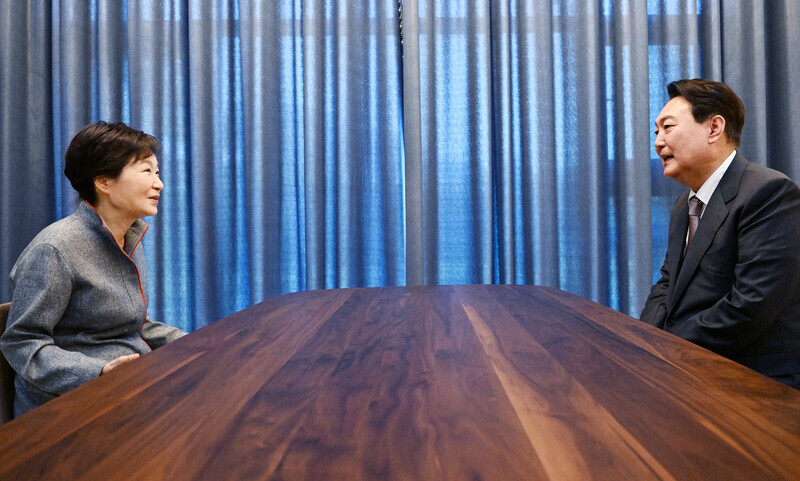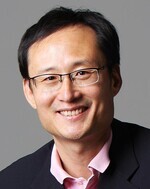hankyoreh
Links to other country sites 다른 나라 사이트 링크
[Column] What is Yoon Suk-yeol so sorry for?


Here’s a story I heard from Kim Eui-kyeom, a former reporter with the Hankyoreh currently serving as a lawmaker for the Democratic Party. Kim was the first to break the story of Choi Soon-sil interfering in the state affairs of the Park Geun-hye administration in September 2016, and the figure who led the investigative team that opened the floodgates of reporting concerning Park’s influence-peddling scandal. As he was busy at the office uncovering the wrongdoings of Park and Choi in November of that year, Kim was paid a visit by Yoon Suk-yeol, then-prosecutor at the Daejeon High Prosecutors’ Office. Yoon was a complete stranger to Kim at the time, Kim said.
They went to a small restaurant near the Hankyoreh’s offices and were talking over glasses of soju when Yoon explained why he had come to meet Kim. Although most people had learned about the corruption within the Park administration through JTBC’s coverage of Choi’s tablet computer, Yoon said, he had read Hankyoreh’s Sept. 20 article concerning Choi’s relationship with the chief director of the K-Sports Foundation and immediately sensed that something was afoot.
Yoon added that the situation had come to this thanks mostly to the Hankyoreh’s reporting. After getting on the bad side of the Park administration, he had been sent to work in different parts of the country and was now stationed in Daejeon, but thanks to the Hankyoreh, he was able to regain his reputation. That’s why he had appeared out of the blue to say thanks, Yoon told Kim.
A reporter who had an acquaintance with Yoon after years of dealing with prosecutors also met with Yoon for a drink after the general election in April 2016. Yoon had been demoted to a position outside the Seoul metropolitan area at the time. According to the reporter, Yoon said that the Democratic Party had strongly urged him to run for the National Assembly prior to the general election. Yoon added that he was so angry at the Park administration that he wanted to join the Democratic Party and campaign for it in battleground regions, but that he gave up on his foray into politics after several people talked him out of it.
These two episodes took place a long time ago, so the specifics of what Yoon said to one former and one current reporter may be slightly inaccurate, but it’s not hard to infer that Yoon held a strong grudge against the Park administration. As he explained to Kim, what saved Yoon from the fate of having to bounce from one province job to another after his probe into online comments made by a National Intelligence Service worker earned him disfavor from the Park administration was the corruption scandal involving Park and Choi.
Afterward, Yoon was chosen as the head investigator of the special prosecution team led by Park Young-soo, which was formed in order to investigate corruption within the Park administration. The world knows that Yoon played a critical role in bringing about Park Geun-hye’s impeachment and arrest. But still, no one would characterize Yoon’s part in the investigation as him acting on his grudge against the Park administration. That’s because the corruption scandal, which involved Park Geun-hye using secret connections in government administration and thereby destroying its system, was too serious to be influenced by personal favors and grudges.
But following his election as president, Yoon has completely flipped his attitude, even visiting the former president in Daegu on Tuesday, when he apologized to Park, saying, “I have nothing to say for myself. I always felt sorry.” Park reportedly listened without a word. Since when has President-elect Yoon felt sorry for Park, and what is he so sorry for? That’s just how politics is, one might say, that being able to join hands with another and bow your head to them after having pointed a knife at them is the reality of politics today.
But still, there are lines that shouldn’t be crossed. Perhaps Yoon’s new stance can be embellished with nice-seeming words like “unity” and “reconciliation,” but that would bruise the hearts of the people of South Korea, who held up their candles with their ice-cold hands as they protested Park all across the country throughout the winter of 2016.
Yoon’s remark that he would “carry on the policies of former President Park Geun-hye and promote them far and wide to ensure she can recover her honor” has tarnished not only the honor of Yoon Suk-yeol the prosecutor, who burned with righteous fury in 2016, but also the honor of the millions of South Korean citizens who brought down the dictator’s daughter with their candlelight.
South Korean politics is now back to the state it was in before Park’s impeachment in 2017. The People Power Party has defied the current of the river called impeachment. But how long will it be able to expand its support base in this way?
The People Power Party’s victory in the presidential election was not a result of the party overcoming the failure of the Park administration’s corruption scandal and regaining the people’s trust through self-reform and change. It was more of a fluke, one it obtained by recruiting Yoon, who had gained popularity by butting heads with the Moon Jae-in administration, and by capitalizing on the Democratic Party’s arrogance and self-righteousness.
But instead of reaching out to people who didn’t vote for Yoon, who account for half of South Korea’s population, in order to consolidate its razor-thin win, the People Power Party is denying the significance of Park’s impeachment, intensifying conflict and division within the country.
Though it may have been a formality, Yoon’s mention of former President Park Chung-hee during his meeting with Park Geun-hye is also hard to understand. Yoon said, “I read materials on how President Park Chung-hee ran the Cabinet and the Blue House [. . .] and I’m learning.” That’s because Park Chung-hee is the very person who established an “imperial presidential system” in South Korean politics, whether that system is a good one or a bad one.
It was during the Park Chung-hee administration in the 1960s that the Office of the President grew exponentially, becoming the control tower of South Korean state affairs. How can Yoon, who has been rushing to move the presidential office out of the Blue House, saying he won’t sleep there even for a night in order to put an end to the figure of the “imperial president,” put up the most imperial president in the history of South Korea as his role model? It’s questionable if Yoon knows that his conflicting values and lack of vision are standing in the way of anticipation for the Yoon Suk-yeol administration.
Please direct questions or comments to [english@hani.co.kr]

Editorial・opinion
![[Column] Season 2 of special prosecutor probe may be coming to Korea soon [Column] Season 2 of special prosecutor probe may be coming to Korea soon](https://flexible.img.hani.co.kr/flexible/normal/500/300/imgdb/original/2024/0426/3317141030699447.jpg) [Column] Season 2 of special prosecutor probe may be coming to Korea soon
[Column] Season 2 of special prosecutor probe may be coming to Korea soon![[Column] Park Geun-hye déjà vu in Yoon Suk-yeol [Column] Park Geun-hye déjà vu in Yoon Suk-yeol](https://flexible.img.hani.co.kr/flexible/normal/500/300/imgdb/original/2024/0424/651713945113788.jpg) [Column] Park Geun-hye déjà vu in Yoon Suk-yeol
[Column] Park Geun-hye déjà vu in Yoon Suk-yeol- [Editorial] New weight of N. Korea’s nuclear threats makes dialogue all the more urgent
- [Guest essay] The real reason Korea’s new right wants to dub Rhee a founding father
- [Column] ‘Choson’: Is it time we start referring to N. Korea in its own terms?
- [Editorial] Japan’s rewriting of history with Korea has gone too far
- [Column] The president’s questionable capacity for dialogue
- [Column] Are chaebol firms just pizza pies for families to divvy up as they please?
- [Column] Has Korea, too, crossed the Rubicon on China?
- [Correspondent’s column] In Japan’s alliance with US, echoes of its past alliances with UK
Most viewed articles
- 1Is Japan about to snatch control of Line messenger from Korea’s Naver?
- 2‘We must say no’: Seoul defense chief on Korean, USFK involvement in hypothetical Taiwan crisis
- 3S. Korea “monitoring developments” after report of secret Chinese police station in Seoul
- 4The dream K-drama boyfriend stealing hearts and screens in Japan
- 5Division commander ordered troops to enter raging flood waters before Marine died, survivor says
- 6[Editorial] New weight of N. Korea’s nuclear threats makes dialogue all the more urgent
- 7No good, very bad game for Korea puts it out of Olympics for first time since 1988
- 8[Column] ‘Choson’: Is it time we start referring to N. Korea in its own terms?
- 9‘Weddingflation’ breaks the bank for Korean couples-to-be
- 10[Column] Season 2 of special prosecutor probe may be coming to Korea soon